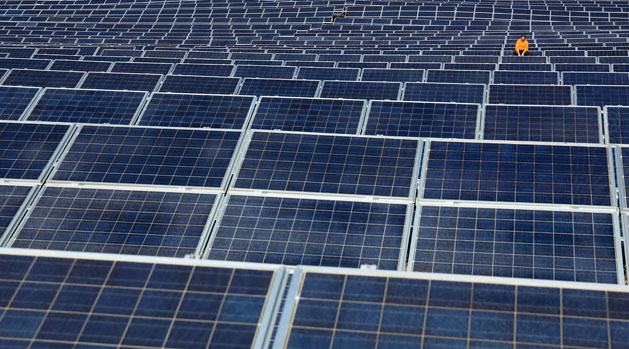Africa can 'quadruple share of renewable energy by 2030'
The continent holds 'some of the best renewable energy resources in the world', says IRENA

Nearly a quarter of Africa's energy needs could be met through renewable energy within 15 years, according to a new report.
The International Renewable Energy Agency (Irena) found that modern renewable technology could help Africa meet 22 per cent of its energy needs by 2030, more than a four-fold increase from five per cent in 2013.
Deploying modern renewables would help bring electricity to rural villages and stop power shortages, spurring on industrial growth and helping to increase prosperity across the continent, the report found.
The Week
Escape your echo chamber. Get the facts behind the news, plus analysis from multiple perspectives.

Sign up for The Week's Free Newsletters
From our morning news briefing to a weekly Good News Newsletter, get the best of The Week delivered directly to your inbox.
From our morning news briefing to a weekly Good News Newsletter, get the best of The Week delivered directly to your inbox.
"Africa holds some of the best renewable energy resources in the world in the form of biomass, geothermal, hydropower, solar and wind," said Irena director-general Adnan Z Amin. "This, combined with the precipitous drop of renewable energy technology costs, creates a massive opportunity for African countries to both transform and expand their energy systems while providing a pathway for low-carbon economic growth."
The continent's Great Rift Valley boasts strong geothermal energy; the central and southern regions have the most biomass and hydropower potential; wind resources are strongest in the north, east and southern regions; while solar resources are rich across the continent.
Amin claims that tapping into these renewable energy resources is "the only way African nations can fuel economic growth, maximise socio-economic development and enhance energy security with limited environmental impact".
The report found that solar and wind projects were already producing electricity at "record-low" prices and that a shift to modern renewable cooking solutions could save around $20bn to $30bn annually by reducing health complications from poor indoor air quality.
The next step is for African governments to help accelerate the deployment of renewable technologies, he said.
Egypt, Ethiopia, Kenya, Morocco and South Africa were singled out as leading the effort to fast-track the use of modern renewable energy sources, while smaller countries such as Cabo Verde, Djibouti, Rwanda and Swaziland were also praised for their "ambitious" targets.
The report offered 14 recommendations for governments to accelerate their uptake further, including adopting regulatory framework to maximise socio-economic benefits and introducing measures to attract investors.
For more on investments, please click here
A free daily email with the biggest news stories of the day – and the best features from TheWeek.com
-
 Local elections 2026: where are they and who is expected to win?
Local elections 2026: where are they and who is expected to win?The Explainer Labour is braced for heavy losses and U-turn on postponing some council elections hasn’t helped the party’s prospects
-
 6 of the world’s most accessible destinations
6 of the world’s most accessible destinationsThe Week Recommends Experience all of Berlin, Singapore and Sydney
-
 How the FCC’s ‘equal time’ rule works
How the FCC’s ‘equal time’ rule worksIn the Spotlight The law is at the heart of the Colbert-CBS conflict
-
 Trump wants to revive coal. Will it work?
Trump wants to revive coal. Will it work?Talking Points Wind, solar and natural gas are ascendant
-
 US charges Indian tycoon with bribery, fraud
US charges Indian tycoon with bribery, fraudSpeed Read Indian billionaire Gautam Adani has been indicted by US prosecutors for his role in a $265 million scheme to secure solar energy deals
-
 Great British Nuclear: one step forward to take two steps back?
Great British Nuclear: one step forward to take two steps back?Talking Point New flagship agency to deliver UK’s next generation of reactors delayed as nuclear output is set to decline further
-
 Will pumping more oil and gas solve the energy crisis?
Will pumping more oil and gas solve the energy crisis?Today's Big Question Experts say boosting domestic supplies is ‘unlikely to tame super-high prices’ in immediate term
-
 Neart na Gaoithe wind farm failure brings scrutiny on subsidy schemes
Neart na Gaoithe wind farm failure brings scrutiny on subsidy schemesSpeed Read Delays in getting a verdict cause UK government body to scupper Holyrood-approved project
-
 Drax deal to convert coal units to biomass burning under threat
Drax deal to convert coal units to biomass burning under threatSpeed Read European Commission is studying whether or not the subsidies being offered breach state aid rules